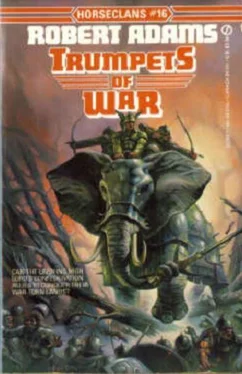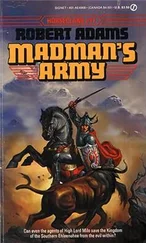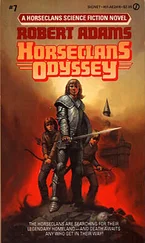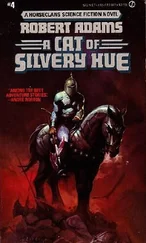Not until he was completely out of sight of the camp, only the more lofty reaches of the city of Ahndropolis still barely visible in the drizzly mist, did Hahkmukos rein up long enough to throw the hooded cloak he had grabbed off a hook as they had left the tent over his gaudy panoply, remove the devilishly uncomfortable helmet and hang it from his pommel and fold the hood up so that the cold water would no longer drip and run down his face. Then he set the horse to a gallop, heading northwestward, away from both Ahndropolis and Mehseepolis.
In the spartanly furnished little office, Thoheeks Grahvos finished his perusal of the sheaf of witnessed oaths of Klaios, the surviving landholders of the Duchy of Ahndros and those of the men that the acting-thoheeks had carefully picked to fill the many vacancies. As the elder man tucked the documents into first a waxed-parchment folder, then a waxed-leather tube, he said, “The Horseclanners will be in the saddle at dawn and I with them, so these should be in Mehseepolis by the end of the week. Never you fear, my boy, you’ll be confirmed, for you’re just the sort of thoheeks we want in these lands. When you’ve set things in order hereabouts and can do so, come to Mehseepolis and take your place on the Council. Until then, I’ll vote your proxy as we discussed.
“Save for the troops we’re loaning you and Ahndros, all Council forces should be on the march back by noonday tomorrow. The order is set for dawn, but I’ve never yet seen an army set out on time and I doubt that I ever will.” He chuckled ruefully. “Yes, the Horseclanners always leave on time, but then they are barbarians and can’t fathom the senseless and inevitable delays of civilized armies. I like them and respect them, they’re probably the finest, the most dependable and effective troops Council just now owns, and I mean to persuade some of them to stay down here, take lands and breed up more of their race.”
As he stood and hitched his light dress sword around to make for easier walking, he admonished, “But, son Klaios, you’ll be wise to keep some sturdy, faithful bodyguards by you and the Lady Ahmahleea and the children at all times, hire a food-taster or two as well, and make constant use of their services. Hahkmukos is a coward—he would not fight anyone breast to breast, not if that opponent was armed—but he is highly dangerous, I feel, nonetheless. I doubt not that that empty drawer that gaped from the side of his travel chest contained gold, so you can be certain that he doesn’t lack the hire of an assassin or three.”
“You feel then that he and his troop of hired bravos will not be back to openly harass the duchy, Lord Grahvos?” asked Klaios, looking a bit worried.
The thoheeks chuckled and shook his head again. “No, I don’t. They didn’t leave together, you know. When Lieutenant Bralos slew their captain, then dragged their employer off almost naked and at the points of spears, they at once elected a new captain, looted everything that could be speedily grabbed up, then rode off headed northeast, while Rahb Vawn tells me that Hahkmukos’ trail veers almost due west. So far as the troop are concerned, I’ll not be surprised at all are they in the camp under the walls of Mehseepolis trying to enlist in our army . . . and I’ll probably recommend taking them on, for they seem to be good, experienced fighters, survivors, and such types Council can always use.”
“How goes it with the young officer?” inquired Klaios, with patent and sincere concern. “When last I set eyes to him, he looked as if a herd of cattle had run over him.”
Grahvos smiled. “Yes, he was a mess when he staggered back to the pavilion—all mud and blood and bruises, and barely able to talk coherently or even see where he was going. He almost brought the roof down atop us all when he walked into that main post.
“But he’ll live. His nose was broken, of course, and a few teeth loosened, but the swelling has subsided enough for him to be able to see and drink broth and wine easily now.”
Klaios nodded. “Good. However, I feel that I owe him suffering-price, since he was, in effect, injured in service to me and to the Duchy of Ahndros.”
Grahvos reached over and gripped the komees’ shoulder firmly and said in a grave tone, “You, Lord Klaios, are a true gentleman of the old school, and I thank the good God that He sent us such as you to rule these lands.
“But worry yourself not in this matter. Lieutenant Bralos has been paid in full for his injuries. I awarded him Hahkmukos’ tent, baggage and furnishings, plus some of the pack mules that the bravos didn’t lift to bear his new possessions back to Mehseepolis. I also gave him to understand that his name is now high on my personal list of young officers deserving preferment.”
Sub-strahteegos Tomos Gonsalos greeted Thoheeks Grahvos warmly when he rode into camp with Captain Sub-chief Rahb Vawn’s clansmen. The older man staggered up the steps and through the anterooms, then virtually collapsed into a chair in Tomos’ office, looking to be utterly drained, thoroughly exhausted.
Deep concern on his face and in his tone, Gonsalos filled a mug with watered brandy and asked, as he proffered it, “Are you quite well, my lord Grahvos?”
“Oh, I’m not ill, Tomos, not really,” groaned Grahvos. “But one more week of hell-riding with those Horseclanners would have seen me dead. Man, those little bastards ride day and night, they stop only long enough to unsaddle their mounts, slap the saddles onto remounts from the remuda, perhaps have a quick piss, then they’re mounted and off again, both eating and sleeping in the saddle—at a fast amble, most often, at that.”
He grinned tiredly. “But by Christ I kept up with the bastards. It became a point of personal and racial honor to me that they not be able to boast that they rode an Ehleen nobleman into the ground.”
Tomos shook his head. “My lord, you are perhaps the most valuable man the Confederation has, our strongest and most faithful supporter in these southern lands, and you are no longer a young man. You could have burst your heart, killed yourself, at such foolishness. Please say that you’ll not again be so stubbornly ...”
Grahvos waved his hand. “Oh, never you fear, my good Tomos, I’ve had a crawful and more of cavalry marching for a good long while. But I also now have even deeper respect for those damned Horseclanners of yours. Lord God, what a weapon they make for our arms. Give them enough of a remuda and I don’t doubt but that they could cover the full distance from east coast to west of this onetime kingdom within three or four weeks . . . and like as not fight and win a battle when they got there.”
The older man drained off his mug of brandy-water and, while his host refilled it, inquired, “Have you seen anything of a stray troop of Ehleenoee mercenary horsemen about in the last few days, Tomos?” Then he recounted all that had transpired with the wretched and craven Hahkmukos in Ahndropolis, ending with the admonition, “So, if they do ride into camp, I’d accept their enlistments, but I’d also break them up, spread them out as far as possible among existing units of our cavalry; otherwise they just might decide to bolt in a tight place, and leave us with a gap in our battle line when and where we least can afford one.”
As he stood to leave for the city, he remarked, “By the way, I have hired away one of your officers, Captain Rahb Vawn, to be my personal bodyguard; he’s even now explaining his decision to Chief Pawl of Vawn. I pay well for service; besides, I’m hoping that Rahb will learn to like it well enough to stay here, marry and breed more of his kind among us. There are still rich lands lacking lords within my and many another demesne . . . which is something that all of you northerners might take into consideration when you plan for your futures.
Читать дальше












